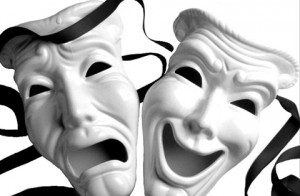The term “story” originates from the word “historein” or “histor” meaning “to inquire” and “wise man, judge”. It is also related to the term “seeing”. A story was meant to give insight.
To create a insightfull story a special framework was used that was based on a cyclic-model. Creating a story was an art and story-tellers (bards) were highly professional people travelling around the country. Storytellers triggered the imagination of their audience.
There is another way of Storytelling. It is based on the Conduit Metaphor. In this case a story is something that is exchanged between people. It is a recall of a situation or chain of situations out of memory.
Stories of this kind can be used to give insight when we use the theories of Roger Schank. Roger Schank researched human memory.
He realized thet people learn when their expectation is violated. At that moment they are very open to the advice of an (older?) expert that made the same mistake and found another solution. Stories of experienced people can be used to teach not experienced people.
When people tell a story out of their memory they use a framework. They select and chain the situations in a certain way. When you analyze life-stories this framework becomes very visible.
The framework behind the stories can be related to the theory of Michael Bahktin. Bahktin showed that there are five basic story-frameworks (tragedy, romance, myth,..). When you use the tragic framework you act like a victim. In the mythical framework people play the roles of kings, heros, magicians, fayries or other mythical beings. Jung calls these mythical beings archetypes
Goffman showed that people play a role in a play. Most of the people don’t know they are playd by the play. They are pawns. Behind every play there is a new play (a meta-play). Somewhere somebody or something is guiding or directing us in our lifes. Some people call this directing principle karma. It is very helpfull to know your karma. If you resolve this puzzle you are free to play the play to want to play. You have left the Matrix.
What can you do?
When you want to use story-telling as a tool to educate please understand that some people are telling the same story again and again. They are pawns and not experts. Experts are hard to find.
When you want to plan interviews the 80/20-rule is applicable. 80% of the stories you collect are about failures and not about solutions or new inventions.
When you want to apply storytelling remember that all the stories that have to be told are already available. They are available in myths and literature. Use one of the many old stories and bring them to our time.
Personal stories are a variant of old stories. The most interesting persons to look for are the Mythics or the Heroes. Joseph Campbell has collected and analyzed the meta-myths.
If you are looking at your own life-story try to find the play or myth you are playing. Try to find out if you are pawn in a play and determine who is your director.
Find out who or what is calling you to go on a Quest. Don’t resist the calling. In the Quest you will learn a lot about your self. In the end you will find the Grale or another tool humankind is waiting for.
Please remember that Heroes are never awarded. Others will take over your invention and claim succes. Don’t bother about that. They are still played by the game of competition. Once in their life (perhaps 1 minute before they die) the will know their own calling.
Leave the play and create your own play. Live a unique life-story and inspire others to do the same. Use the toolmaker methaphor.Explore and create new tools. Share your inventions with others.
 Erving Goffman
Erving Goffman 